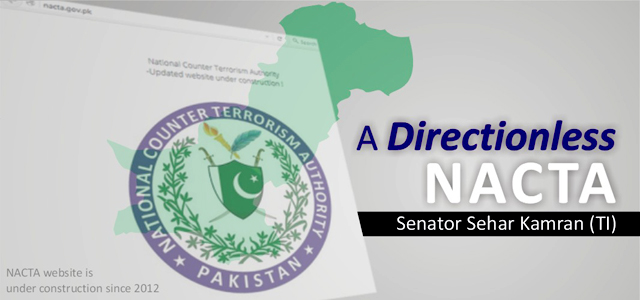By Senator Sehar Kamran (TI)
Nov 24, 2015
“Missiles may kill terrorists. But, I am convinced that good governance is what will kill terrorism.”
–UN Secretary General Mr Ban Ki Moon Addressing the General Assembly Thematic Debate, April 2015

Six years after its initiation, the National Counter Terrorism Authority (NACTA) – an ambitious directorate formulated to lead Counter Terrorism (CT) efforts within the country – continues to remain dormant. The purpose of establishing this directorate under NACTA was to setup a Centre for coordination and intelligence sharing among the 26 spy and law enforcement agencies in Pakistan, to enhance their abilities to curb acts of terrorism. But despite having been established through an act of Parliament in 2009, the legal status of the organization remained ambiguous until the passing of the ‘NACTA Bill’ on April 11th, 2013, which finally provided a legal basis for the directorate to conduct its operations.
NACTA also came to be designated as the focal organization for national security under the National Internal Security Policy (NISP) 2014-2018, approved by the Government of Pakistan on 25th of November, 2013. Undeniably, the principles upon which NACTA was established were honorable; to collaborate with international actors on areas like CT, to develop a national de-radicalization program with the support of partner institutions, and to provide a holistic counter terrorism strategy by implementing NISP, in true letter and spirit, with the help of Provincial Governments, Law Enforcement Agencies (LEAs), and intelligence agencies. Furthermore, one of the core objectives of NACTA was to carry out specialized research relevant to terrorism and extremism, to appoint a committee of experts from Government and non-Government organizations for deliberations in areas related to the mandate and functions of the Authority as well as to prepare and circulate appropriate documentation on the basis of these consultations and research. Unfortunately, however, that is not what has transpired.
NACTA, which was placed fourth on the agenda of the much-discussed National Action Plan, today is merely another redundant body with little say in the formulation or implementation process of policies related to extremism and counter terrorism. Rife with controversies, legal challenges and ambiguity of status, and faced with discontinuity in policies and lack of funding, the ambitious body of NACTA has become an entity which will probably never function fully.
NACTA could have played the role of a premium institution, leading both CT and CE research, mechanisms and strategies in the country and enhancing implementation and monitoring via interdepartmental coordination. Its unique central coordination abilities ought to have allowed it to identify vulnerable areas in addition to providing assistance to law enforcement agencies. NACTA’s abilities to strengthen law-enforcement in the country’s existential fight against terrorism and extremism has became overshadowed by this plethora of challenges.
The position of ‘National Coordinator’ or the head of NACTA, has been occupied by five people in the last two years only. The task of National Coordinator is to execute and monitor policies implemented by NACTA, but regrettably, the body has not been able to formulate anything. Against the present 300 posts in the anti-terror body, the current strength is just 57 which again highlights its incompetence.
Today, when Pakistan is fighting a war of its survival, where internal stability is at stake, and the one year anniversary of National Action Plan is fast approaching where “strengthening and activation of NACTA” was included in 20 points, there was no mention of any funds for the premium counter-terrorism body NACTA in the budget presented FY 2015-2016. The minister of finance in a post budget press conference tried to pass the matter by claiming its budget was included in the Ministry of Interior’s allocation but a denial from a Ministry of Interior official refuting the Minister of Finance’s statement depicted how sorry the state of affairs of NACTA is. In addition, the ministry had requested Rs.960 million from Finance Ministry for activation of NACTA but no progress has been made in this regard.
Another hurdle in the activation of NACTA has been a confusion over its legal status. In 2014, Islamabad High Court gave a ruling removing the then NACTA head and placing the command of NACTA under Prime Minister. This ambiguity over the legal status has resulted in the delayed materialization of NISP and NAP on ground, as NACTA was supposed to be the institution that oversaw their implementation.
Even after almost six years of its launch, this counter terrorism body has technologically and administratively not evolved as a frontline institution, as it should have. The capability to formulate and gather its own intelligence information is still missing. Administratively, there is no consensus among the relevant institutions on the operational mechanism of the counter terrorism body. To prevent NACTA from becoming a superfluous body, and to ensure its existence as an effective institution, it is recommended that NACTA’s status be rectified, to enable it to act as an authoritative body. It may also be attached to the Prime Minister Secretariat, and the status of the ‘NACTA Coordinator’ be elevated to that of a minister of state, reporting directly to the Prime Minister. This could help alleviate the growing problems faced by the nascent organization, and enable it to start operating effectively at the earliest.
Another important factor in this context is the allocation of required/appropriate funds and their timely release. This will allow for the development of a skeleton structure that may work on developing a basic framework for the organization. Such a structure should be comprised of personnel selected on the basis of qualification and merit, through a transparent system, preferably through the Federal Public Service Commission. Similarly, the recruitment of top level professionals within the actual institution is also vital for its functionality, and will reaffirm the basic aim behind establishing NACTA as Pakistan’s premium counter terrorism body.
Finally, the current practice of changing NACTA heads every few months must end. Appointing favored personnel on ad-hoc basis has proven highly detrimental in the past in the past, and will continue to do damage the institution. Only when these underlying issues are resolved can NACTA become able to fulfil its purpose and conduct regular coordination meetings between national and provincial CT departments as well as relevant agencies, which are necessary for establishing an effective monitoring system to counter the threat of terrorism and violent extremism in Pakistan.
Same version of the article appeared in The Nation


